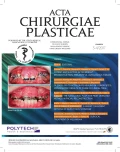Editorial
Published in:
ACTA CHIRURGIAE PLASTICAE, 59, 3-4, 2017, pp. 119
Category:
Editorial
Dear and beloved readers,
you just opened the last issue (or a double issue) of the year 2017. At the end of each year, it is a custom to look back over the past year or to look to the future and think about what is ahead of us in the future. I would also like to look in this editorial to the deep past as well as to the near future.
As a beginner in plastic surgery, I once had an idea that all unanswered questions, or at least their majority, could be properly answered on the basis of evidence-based medicine. It means that if we are not sure whether our patients are being treated properly, we can just search the literature, evaluate the articles found and decide on the appropriate treatment option, or perhaps do such study ourselves and prove that the chosen procedure leads or does not lead to the best results. I think it was a partly wrong idea.
It is true that we were able to accumulate and publish a huge amount of knowledge, but not always on solid scientific basis based on evidence-based medicine rules. One explanation for this may be that a large number of published papers still lack sufficient quality or they are not methodologically perfect. Perhaps we feel it subconsciously and therefore our decisions are still largely based not on evidence-based medicine but on our own preferences and experiences, or on the empirical experiences and recommendations of our teachers. Why is that and is it so bad?
Plastic surgery, maxillofacial surgery, aesthetic surgery as well as other surgical disciplines as such differ fundamentally from non-surgical disciplines such as internal medicine, oncology, neurology and other non-surgical disciplines. For non-surgical specialties, a number of robust, homogeneous, prospective, double-blinded and randomized studies, review articles, or meta-analyses are published that meet all evidence-based scientific criteria. They can afford the “luxury” to make decisions based on valid data and their treatment strategies can then be effective enough. However, are there similar “strong” studies also available for plastic surgery? And is it even possible to do such studies?
Factors that make it difficult to evaluate the effectiveness of different surgical procedures can be, for example, lacking homogeneity of the evaluated groups of patients. Patients enrolled in the treated and control group are not exceptionally different only in one, just evaluated and examined aspect or parameter. Too much heterogeneity in the group can then influence the conclusions of the study. Another problem in some less common diagnoses maybe the inability to collect a sufficient number of patients to provide general recommendations. It is even more difficult at all times to ensure that all patients in such a surgical trial are operated by equally experienced and qualified surgeons.
Not only these factors show us that perfection in plastic surgery cannot be achieved solely on the basis of evidence-based medicine. Of course, we need this kind of information, but we also need the expertise, insight and intuition of our much more experienced colleagues. Even knowing that opinions based on personal experience – “eminence-based” instead of “evidence-based” medicine may be incorrect or misleading, for example, when senior colleagues do not update their knowledge on an on-going basis and do not confront it with current knowledge. Even so, the daily interaction of surgeons with their experienced colleagues is an invaluable source of information for good clinical practice. I think it’s just as important as the use of evidence-based knowledge.
Despite the above-mentioned doubts, we must use evidence-based medicine as a useful and important tool in our decision-making. However, we must not forget the knowledge, which is based on personal experience of our older colleagues. I wish you all, our readers, to be able to correctly balance both approaches. That is why we will continue trying to present not only the findings based on large randomized studies and evidence-based medicine but also the knowledge based on personal experience and our authors’ own opinion. We are aware of the strengths and weaknesses of both approaches, but we trust your ability to deal with it.
Inspirational reading wishes
Aleš Fibír, M.D., PhD.
Editor-in-chief
Acta chirurgiae plasticae
Labels
Plastic surgery Orthopaedics Burns medicine TraumatologyArticle was published in
Acta chirurgiae plasticae

2017 Issue 3-4
- Possibilities of Using Metamizole in the Treatment of Acute Primary Headaches
- Metamizole vs. Tramadol in Postoperative Analgesia
- Spasmolytic Effect of Metamizole
- Metamizole at a Glance and in Practice – Effective Non-Opioid Analgesic for All Ages
- Safety and Tolerance of Metamizole in Postoperative Analgesia in Children
-
All articles in this issue
- Editorial
- PATIENT SATISFACTION AFTER BREAST RECONSTRUCTION: IMPLANTS VS. AUTOLOGOUS TISSUES
- OLEOGEL-S10 TO ACCELERATE HEALING OF DONOR SITES: MONOCENTRIC RESULTS OF PHASE III CLINICAL TRIAL
- THE NASOLABIAL FLAP: THE MOST VERSATILE METHOD IN FACIAL RECONSTRUCTION
- CURRENT TREATMENT OPTIONS OF DUPUYTREN´S DISEASE
- SURGICAL TREATMENT OF MELANOMA
- POSTOPERATIVE FIXATION AFTER REPOSITIONING OF PREMAXILLA IN A PATIENT WITH BILATERAL CLEFT LIP AND PALATE – CASE REPORT
- Acta chirurgiae plasticae
- Journal archive
- Current issue
- About the journal
Most read in this issue
- THE NASOLABIAL FLAP: THE MOST VERSATILE METHOD IN FACIAL RECONSTRUCTION
- CURRENT TREATMENT OPTIONS OF DUPUYTREN´S DISEASE
- PATIENT SATISFACTION AFTER BREAST RECONSTRUCTION: IMPLANTS VS. AUTOLOGOUS TISSUES
- OLEOGEL-S10 TO ACCELERATE HEALING OF DONOR SITES: MONOCENTRIC RESULTS OF PHASE III CLINICAL TRIAL

